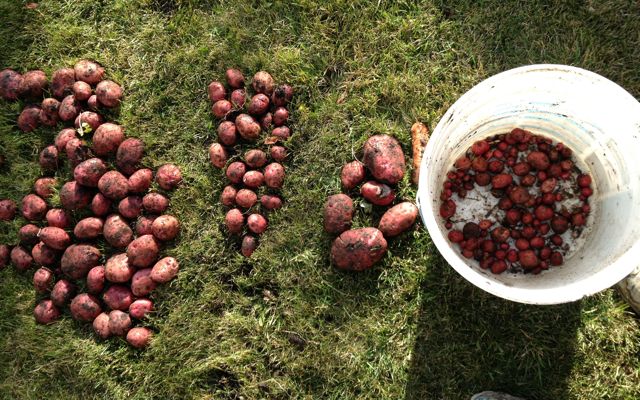 Canola Oil is often touted as a healthy oil. This is one of the great health myths perpetuated by vested interests.
Canola Oil is often touted as a healthy oil. This is one of the great health myths perpetuated by vested interests.
Personally, I avoid canola oil. I don’t cook with it and I don’t buy anything that lists canola as an ingredient. This policy eliminates much processed and restaurant food from my diet. I don’t even give canola to my dog. (She gets olive oil, fish oil and coconut oil.)
Here are seven reasons to avoid canola oil.
1. Canola is a genetically modified organism. Canola is almost always genetically modified. GMO may seem like a smart idea but there is evidence that splicing genes from unrelated species could have disastrous effects on our health.
Little testing has been done. GMO companies’ tests rarely last longer than three months. GMOs and their effects are forever in the system, our bodies, as well as the food system. We’re all supposed to assume that nothing is amiss, that GMOs are no different from other foods. If that’s true why do they grant patents on GMOs?
I know that the government, big agriculture and the big food companies cannot be entrusted with my health. So to be prudent, I avoid GMOs as much as possible. (This is why I want GMO labeling).
See related article: http://wakeup-world.com/2013/08/28/13-lies-about-gmos-and-gmo-labeling
2. Canola contributes to the poisoning of our environment. Canola is highly engineered so it can withstand repeated dousings of glyphosate (RoundUp), sprayed on canola and other crops to kill weeds.
Glyphosate is showing up in water supplies at several times the “safe” level. In fact, California recently raised the official “safe” level of glyphosate exposure, from parts per billion to parts per million (a thousand-fold increase!) not because it’s safe but because that’s what’s in the water and they really don’t know what to do about it!
RoundUp, a Monsanto product, is detectable in soil, water and food virtually everywhere on earth. None of us can escape this film of poison draped over the planet.
Glyphosate, in parts per billion (ppb) is known to alter DNA in humans. With RoundUp levels now measured and supposedly regulated in ppm we need to brace ourselves for the mass mutation of the human species. We wonder why cancer rates have burgeoned!
In addition to DNA damage, RoundUp’s ubiquitous reach and overuse has spawned superweeds, organisms that no longer respond to normal applications of RoundUp, requiring ever-increasing doses of this deadly drug.
I prefer not to be responsible for the pollution of our water, air and soil. I prefer not to contribute to cancer via my consumption of products that are known carcinogens. One way is to avoid products that are routinely raised with RoundUp. Canola is one of the biggest offenders.
See related articles: http://www.naturalnews.com/040808_glyphosate_breast_cancer_drinking_water.html
http://www.naturalnews.com/041464_glyphosate_monsanto_toxicity.html
3. Canola is actually inedible. Canola started out as rapeseed. Rapeseed oil was used as fuel in diesel engines. In fact, Rudolph Diesel, the inventor of the diesel engine used vegetable oil diesel (often made from rapeseed) long before petroleum-based diesel became commonly used as fuel.
4. Canola is processed with dry-cleaning fluid. Someone got the brilliant idea that with modification, canola could serve a whole new market as a food product. Early canola oil used to stink like rotten fish. I remember my mom trying it once and the smell of it cooking gagged us.
To remove the stench, one of the required processes is “washing” canola oil in hexane, a solvent used in the dry cleaning business. Personally I am suspect of food products that are exposed to solvents and other harsh chemicals. I was taught as a child that solvents are generally unsafe to consume. I can barely stand the smell of freshly dry-cleaned clothes; how could I possibly eat them?
5. Canola oil is not organic! Don’t be fooled by the labels. Canola oil is never organic. It is a genetically modified organism, raised with chemical fertilizers and pesticides, and processed with dry cleaning fluid. Every one of those disqualifies it as an organic food.
6. Canola oil tastes terrible. Hexane may remove the stench but the bitter taste remains. I’ve accidently bought hummus made with canola instead of olive oil and it’s bitter and inedible. I turned a friend onto baklava, usually made with butter and/or olive oil. She bought some that was bitter and disgusting and couldn’t understand why. The label revealed it was made with canola.
7. Canola oil is not as healthy as they claim. The health claims pertaining to canola are based largely on the theory that saturated fats cause heart disease, which we must question. Per capita consumption of saturated fats is down over 30 years yet heart disease ravages our society.
Canola does contain Omega 3 and 6 fats, in a 2:1 or 3:1 ratio, depending on processing method and the source of information. The recommended ratio of omega 3 to 6 fatty acids is one to one. The average North American has a 1:20 ratio! Too many Omega 6 fatty acids cause inflammation, which is implicated in many modern chronic illnesses. While canola can help balance too many omega 6 fats, I prefer to get my Omega 3’s from other sources.
Canola has a high flash point making it popular for deep-frying, which is dangerous for one’s health. The frying of proteins and carbohydrates in fats creates many carcinogens and contributes to obesity and heart disease.
Admittedly, there is nothing prettier than driving through a patchwork quilt of crops emboldened by brilliant yellow fields of canola. So many farmers grow this crop that canola fields in bloom are almost synonymous with being a farmer on the Canadian prairie. Unfortunately hollow health claims cannot change the fact that canola, far from being a health food, is actually an Unfood.
A Google search of Omega Fatty Acids or Omega Oils reveals many interesting and educational sites. Here are a few I found.
See: http://en.wikipedia.org/wiki/Ratio_of_fatty_acids_in_different_foods
http://en.wikipedia.org/wiki/Omega-3_fatty_acid
http://omega6.wellwise.org/omega-6-omega-3-ratio
http://chriskresser.com/how-too-much-omega-6-and-not-enough-omega-3-is-making-us-sick
